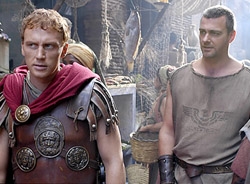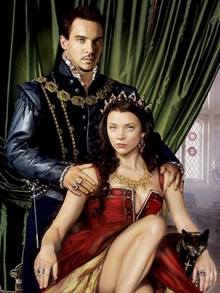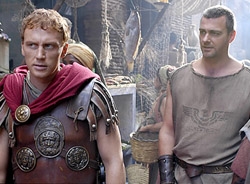History: Contains Spoilers for Rome and The Tudors.
Warning: This post contains spoilers for the TV shows Rome and The Tudors! Cesar is stabbed! Anne Boleyn loses her head! So what is the point in watching those shows, you say? Well, when not written by a dull and dry textbook author, history can be very exciting (and much more cruel than any splatter film you can think of).
 Rome was a truly epic TV show – so epic, that the producers couldn’t afford to do more than two seasons of it – and we’re talking about HBO and the BBC here. Which is quite sad, because towards the end of season two, you start to notice how they rush through history. Even if they would have wanted to make a third season, it would have become a financial hassle – sadly, a fire burned down parts of the studio sets. The remaining parts have still been used filming the Doctor Who episode The Fires of Pompeii.
Rome was a truly epic TV show – so epic, that the producers couldn’t afford to do more than two seasons of it – and we’re talking about HBO and the BBC here. Which is quite sad, because towards the end of season two, you start to notice how they rush through history. Even if they would have wanted to make a third season, it would have become a financial hassle – sadly, a fire burned down parts of the studio sets. The remaining parts have still been used filming the Doctor Who episode The Fires of Pompeii.
Rome shows us Roman history from 49 BC to 31 BC from the point of view of the two Roman soldiers Lucius Vorenus and Titus Pullo. They have been mentioned in a document by Cesar, but their life stories in Rome are mostly fictionalized. Also, they do a good job in handing their likeability back and forth. With it’s cast of relatively unknown actors, Rome ensures talent before popularity. Great actors, great costumes, great sets, great sex & violence and great stories combine as the most possible authentic portrayal of ancient history you could think of.
Rome takes a lot of liberties with history, though. This means that it would be much better to have a general knowledge about Cesar’s and his heir’s life or at least checking their Wikipedia page before watching. But unlike altering the events of a book for a movie screenplay, which is usually a mess, the ideas Rome‘s writers had were very intriguing (and sometimes quite fun).
I don’t like tossing around words like “must-see”, but when it comes to Rome, this term applies. I needed about 5 episodes to get really hooked, but then I couldn’t wait to see what would happen next. And even if you know your history – e.g. how and when Cesar or Cleopatra are going to die – it will just increase the anticipation to these events.
 1548 years later, HBO’s “rival” Showtime shows us another historical TV show: The Tudors. The Tudors introduces us to the life and wives of King Henry VIII of England. It takes fewer liberties than Rome, but with this style it is sometimes very confusing for those who know the history. The probably most vexing aspect is that kids seem to grow up within two hours, while the remaining cast doesn’t look a second older. Take a look at Princess Mary: in one episode she’s 4 years old, and then in the next, pooof, she’s 16, all while her dad remains in his early 30s (or however old the actor might be).
1548 years later, HBO’s “rival” Showtime shows us another historical TV show: The Tudors. The Tudors introduces us to the life and wives of King Henry VIII of England. It takes fewer liberties than Rome, but with this style it is sometimes very confusing for those who know the history. The probably most vexing aspect is that kids seem to grow up within two hours, while the remaining cast doesn’t look a second older. Take a look at Princess Mary: in one episode she’s 4 years old, and then in the next, pooof, she’s 16, all while her dad remains in his early 30s (or however old the actor might be).
Other than those little anachronisms, the show is totally worth watching. The 16th century history of Britain has always been a favorite of the entertainment industry, and for good reason. In order to be able to change his wives as often as his royal boxer shorts, Henry VIII founded the Church of England. That led to a reformation with lots of torture and bloodshed, even more torture and bloodshed when Mary I became Queen, and then some more torture and bloodsheed when Elizabeth I became Queen.
The Tudors begins around the time when Henry VII is introduced to Anne Boleyn. He falls madly in love, fights for a very long time to be able to marry her, marries her, and then has her killed. Again, knowing the “spoilers” just increases the anticipation of events.
The cruelty of history seems to increase with every season in The Tudors. When in need of a confession, people were sadistically tortured and afterwards sadistically executed. Of course, nobody cared if they were actually innocent (so it happened in The Tudors for Anne Boleyn’s would-be lovers). Beheading seemed to be a favorite, but other methods included boiling alive, burning alive, having a hot stick of metal shoved up your ass, having your guts cut open, and so on. It only gets worse when your executioner is drunk (I knew where it would lead, but I kept watching)…
The Tudors often reminded me of The Sopranos – or was in a way proof of the medieval mindset the mafia still has. In both cases people were executed as soon as they did even the tiniest thing wrong. The mafiosi can just be lucky that these days we have guns, so they don’t have to die slowly and sadistically. And all in the name of God.
The Tudors can show off a few more “stars” in it’s supporting roles than Rome did – Sam Neill in season one, Peter O’Toole in season two and Max von Sydow in season three – I wonder how they want to top that in season four. Unfortunately the main roles haven’t been cast so brilliantly. Jonathan Rhys Meyers (Henry VIII) is a pretty average actor but not brilliant, Natalie Dormer (Anne Boleyn) is even worse. In some scenes she’s on the level of any given school play actor, or in other words, lame. But at least she did a good job with her last words.
I think it would be impossible to decide which of these two historical shows is better – Rome or The Tudors. They both have their pro’s and con’s, but since they are so hugely different in nature, it would not only be impossible, but also be unfair to compare them. But one thing is for sure: They are definitely both worth watching!


2 Responses